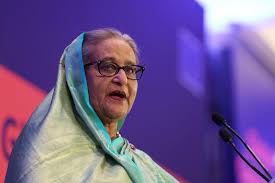
Sheikh Hasina Sentenced to Death: Political Turmoil in Bangladesh
A Bangladesh court has issued a shocking verdict, sentencing former Prime Minister Sheikh Hasina to death for crimes against humanity. This ruling stems from her alleged involvement in a violent crackdown during a student-led uprising last year, where numerous lives were lost. The court found Hasina guilty on multiple counts, including incitement and failure to prevent atrocities. The announcement was made in Dhaka, amid tight security and in Hasina’s absence as she currently lives in exile in India.
In a statement, Hasina labeled the verdict as biased and politically motivated, arguing that she was not given a fair opportunity to defend herself. The former Prime Minister, who has been a dominant figure in Bangladesh politics, claims that the tribunal was rigged and set up by an unelected government. As the country gears up for parliamentary elections scheduled for early February, fears are rising that this verdict could provoke fresh unrest among her supporters.
The International Crimes Tribunal, which delivered the judgment, indicated that Hasina orchestrated and enabled severe violence during the July-August protests, including the use of drones and lethal weapons against civilians. The case against her has been extensive, with documents detailing over 8,700 pages of evidence and testimonies from victims.
With her party, the Awami League, barred from contesting the elections, Hasina’s political future hangs in the balance. Her son, Sajeeb Wazed, has stated that they do not intend to appeal the verdict until a democratically elected government is in place, suggesting a deepening political crisis in Bangladesh.
As political tensions escalate, Hasina’s supporters are reportedly contemplating a boycott of the upcoming elections, which could further destabilize the already volatile political landscape of the country. The implications of this verdict are significant, not just for Hasina, but for the future of democracy in Bangladesh as it faces one of its most challenging political moments in recent history.










